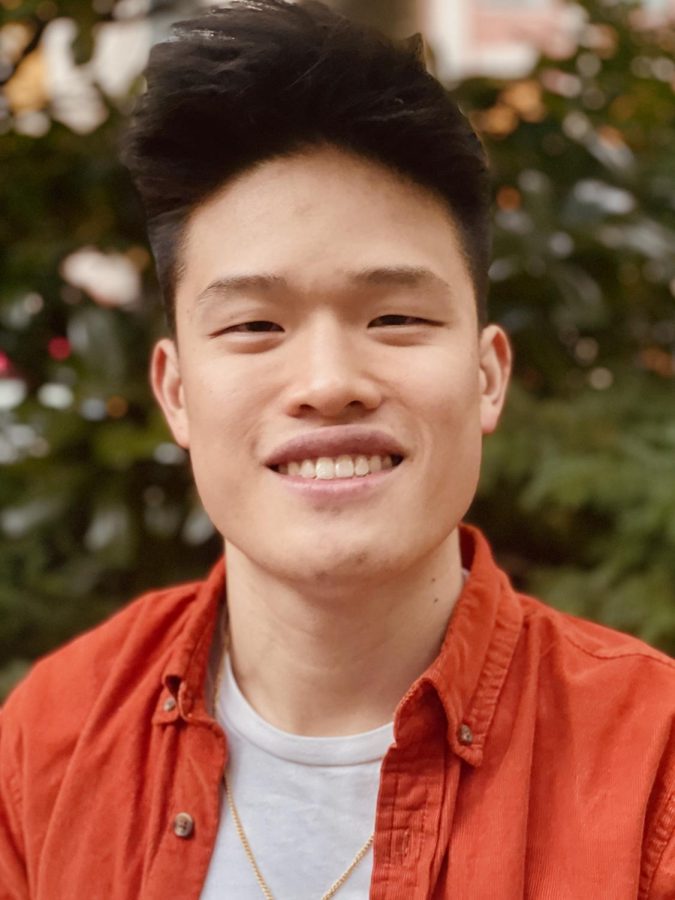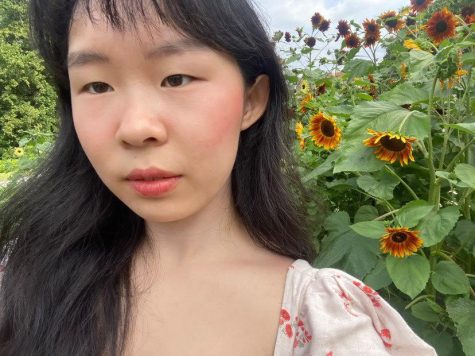Notable Alumni Interview Series #8: Skyler Chin
May 24, 2023
Skyler Chin is a musical theater composer and playwright born in San Francisco and raised in New Hyde Park, NY. He and his writing partner Sita Sunil co-wrote the book, music and lyrics for “Illegal: A New Musical,” a musical about Asian American history. “Illegal” was named a finalist for the Richard Rogers Award and a semifinalist for the Eugene O’Neill National Music Theater Conference. Skyler and Sita were commended by US Congresswoman Grace Meng, NY Assemblywoman Gina Sillitti, and Senator Anna Kaplan for responding to anti-AAPI hate crimes via art, and “Illegal” has been performed in partnership with educational and cultural institutions across the country. In addition, they were commissioned by Prospect Theater to write a short musical, “High Time for Chai Time,” as part of their 2022 Theater Lab cohort. They currently attend the BMI Lehman Engel Musical Theatre Workshop and are working on several new pieces and performance events in 2023. You can follow them on IG @sky.sam.chin and @sitacolor!
Sophia Liu: When did you attend Great Neck South High School? What was your most memorable experience?
Skyler Chin: I attended from 2011 to 2015. One thing that’s cool about living in New York is that your friends who went to high school with you several years later might still be around. So I’ve been seeing people from high school come to my shows. Friendship was a really big part of high school.
I did the Battle of the Bands for several years in the Contemporary Music Club with Mr. Virgilio. I also taught Wushu for Cultural Heritage Night. That was really fun because we did a lot of fight choreography for that. One time during senior year, my friends who were organizing the Cultural Heritage Night were unconfident that the martial arts groups would be any good on their own, so they made the Wushu and Tae Kwon Do people fight each other for like 10 minutes straight. That was really fun because that was one of the first martial arts collabs that I had done.
Those are some major highlights. The teachers are awesome. I’m friends with Mr. Ko and Coach B. on Facebook. I was able to do really cool things. I don’t know how many schools have a guitar class. I was just getting back into guitar recently and it feels very fulfilling having learned how to play guitar at South and doing it professionally now.
SL: Was there a teacher at South that particularly influenced you?
SC: It was really cool to see my middle school music teacher, Mr. Schwartz, make political, creative songs and post them and express his opinions creatively online. He was definitely an inspiration. Mr. Virgilio was cool in how he let people explore their creative passions through guitar.
My Chinese teacher, Ms. Yang, was an inspiration. It was really funny because I was so bad at Chinese in her class. I even dropped out at one point and then went back to it senior year. I was always terrified of her, but I went back to the class because I was just interested in learning Chinese. My family are sixth-generation Americans, so we don’t speak Mandarin. I remember Ms. Yang gave me an award at the end of the year because I persevered, which was really encouraging. In college, I kept studying Chinese.
Mr. Tuomey also inspired me because I took AP Environmental Science senior year, and I studied that in college. Another shout out is Mr. Baravarian, or Coach B, the fencing coach. I’m still friends with him, and he was a really good coach.
SL: On that note, your fencing picture is still displayed near the West Gym. How was your time fencing at South?
SC: It was great. I really liked the community. People did fencing for so many different reasons. I was probably one of the most competitive fencers because it was my main extracurricular until college. It was really fun just going around to fencing meets and strategizing against all the other Long Island fencing teams. I have a lot of good memories training. Even when people were stuffed with Thanksgiving turkey during break, they still showed up to exercise and train. I just feel nostalgic about the whole thing because it was really fun to have a team and hit people with sticks.
SL: You described on your website the dissonance you felt growing up as a sixth-generation Chinese American in a community of primarily first-generation immigrants. How did you access your family’s history and navigate that feeling of separation from your peers?
SC: I was always really interested in the different stories that my grandparents and aunts and uncles and everybody in my family had growing up. I have a cousin/uncle Alvin Eng who is a playwright and refers to himself “The Last Emperor of Flushing,” and he published an awesome book about it because he was one of the first few Asian Americans in Flushing [before the significant wave of Asian immigration]. A lot of my family members have the experience of being one of the only Asian people in whatever community they were in. Their stories were super interesting to hear. I was always just asking them questions about their identity and what sort of issues they were passionate about.
I talked a lot with my grandma, who was born and raised in New Haven, about what it was like being Chinese American through like all the events we learned about in U.S. History, like what it was like growing up during the Great Depression and how she met her husband during World War II when she was working as a secretary at Yale and he was sent by the army to study Chinese to then go fight for the US. It was so interesting to hear about what it was like to go through segregation being neither Black or white and how you would be treated depending what state you lived in and how people saw you. I felt like I wanted to tell those stories, and that’s what inspired me to create Illegal.
SL: You wrote Illegal your senior year at Yale. What was it like writing a full-length musical in such a short period of time, and how has Yale influenced your work?
SC: When people write musicals, a lot of the time they tend to really shrink it down. They tell people that, oh I wrote this musical in like six weeks. But then in reality, they were really thinking about the concept for a long time, like several years. That was the case with us. Sita and I wrote the vast majority of it during senior year of college, in nine months, but we were definitely thinking about it from 2016 through 2019, for like three or four years. It was definitely circulating in our heads before Trump was elected and when people were talking about his ridiculous policies.
As Asian Americans I feel like we had to say something because it felt like our history was being repeated with Trump’s proposals to ban certain ethnic groups from coming into the country and build walls. It felt like history repeating itself, which was very personal to me because that’s what happened to my grandparents. Because I wasn’t taught Asian American history in school, I felt that this conversation had to be ignited.
I had interned at the Angel Island Immigration Station Foundation as part of an eye-opening Yale program freshman year. There, I was really blown away by all the poetry and all the history and all the different Asian ethnic communities that were impacted by the same policies.
I took that back into the university spoken word group that I was in with Sita, and she’s an amazing composer. So then we were like, Ooh, maybe we should write some songs based on this source material and show how it connects with the present day. We wrote and performed several of the songs as part of that spoken word group. That evolved over several years into a full-length musical that we wrote our senior year.
SL: How has Illegal transformed from the first draft and through different performances?
SC: The reaction to it has evolved. Originally in 2019, it was mainly a reaction to the previous presidential administration. Then COVID-19 hit, and there was a spike in hate crimes. Asians, including myself, were being targeted on the street and personally blamed for the pandemic. The themes of Illegal started to resonate in yet another way. We revised the musical, tightening up a lot of the songs and the structure and the interactions between the characters to amplify the emotional moments.
I really credit Sita for developing Illegal’s storytelling. I focused on the history and research development, and she thought about what would be entertaining to show the audience and the character development—all the things talked about in English class like theme, characterization, and conflict–the parts that draw you in!
SL: The cast for Illegal is so brilliant, and I was even more impressed to find out that all of the cast members have full-time jobs or are full-time students outside of being musicians. How did the cast for Illegal come together?
SC: Yeah they’re so dope! Some of our performers were recommended by people who had previously worked with them and some of them auditioned whenI posted in the Asian American Performance Alliance Facebook group. They’re all really cool and they all have different backgrounds. Some of them are actors in anime, some of them are involved with K-dramas and some of them are composers and other things like that. They’re just so talented and it’s really wonderful to work with them.
SL: You also have a Bachelors in Environmental Science. What sparked your interest in environmental studies, and how does this interest coalesce with your musical and artistic ambitions?
SC: I was always interested in systemic issues and environmental justice questions. For example, I’m interested in looking at the different health effects of zoning laws and how discrimination and certain policies result in people of color living in certain areas being disproportionately exposed to pollution. That’s a personal issue for me because my dad, who passed away, grew up in Chinatown, and he had respiratory health issues. The doctors had said that it was in part an environmental injustice issue because of the way that the environment was designedChinatown.
Even after 9/11, there were high incidences of asthma in Chinatown because of the way the urban planning worked. I was also taking AP Environmental Science senior year, and it was really interesting to talk about and look at the way that different issues intersect. If you look at ecology or carbon accounting, they’re all interconnected.
Sita also majored in Ecology & Evolutionary Biology. We’re both very interested in so many different topics that influence both of our art. For me, I’m always interested in how to make academic or historical events relevant like with Illegal. Sita, in her painting practice, uses her study of animals and biology. I feel like there’s a lot that you can pull from many different disciplines.
SL: What really struck me about Illegal is how the characters insist on and persevere for their American Dream. In the face of America’s heavy and sustained historical violence, the American Dream can often feel like an elusive fabrication, a hypocrisy, or even an outright lie. What does the American Dream mean to you? Do you think it is something achievable?
SC: That’s a great question. The American Dream has a very interesting cultural narrative, and it means a lot of different things for a lot of different people. The traditional one is to buy into the meritocracy and you get a house with a picket fence in the suburbs and everybody has a fair shot. In reality, it is so much more complicated than that and many people continue to be denied that shot. But we still fight to have our voices heard. ne of Illegal’s songs, “Keep Dreaming,” is about fighting for your version of the American Dream and making that a reality for you and for others no matter how hard it is.
Even if the odds are against you, there’s a certain fighting spirit that I’ve seen Asian people, Black people, immigrants from around the world, have. They fight for a better future for themselves, for their kids, for future generations, and for each other. You know, in the 1950s, when my grandparents were moving to Long Island, their neighbors tried to kick them out because of negative stereotypes. My family became very involved in activism, which I’m proud of. I’m glad they stuck it out and people came around to accept us! The odds are against you, but people still keep persevering. At one of our shows recently, I got to speak with someone whose parents are “illegal” immigrants from El Salvador, and he said the themes he heard in our musical really resonated with him and he hopes that audiences can really make the connections between what my grandparents went through and what his parents are going through now.
SL: Outside of Illegal, you’ve released a variety of songs on Spotify like “Froggy Chair.” Where do you find inspiration for these songs?
SC: Props to Sita for “Froggy Chair” – she introduced me to the wonders of video game composition. Sita has this theory that video games are one of the coolest, most interesting and complicated forms of art because they combine so many disciplines. She was originally a symphonic and instrumental composer and was really inspired by film and video game music. So she got me into listening to video game music, like Animal Crossing, Xenoblade, Pokemon, and Phoenix Wright… We’ve been really into that, especially in recent years. It’s a goal of ours this year to produce and put out those kinds of songs that are in our heads and that we want to share and spread some cheer. We also have a holiday song called “Festive” that we did with our friends Treston Codrington, Emil Beckford and my brother Devin.
SL: I’m curious about your passion for martial arts. How has being a martial artist shaped your identity and work?
SC: It’s both a cultural and a personal thing. My father taught martial arts. He was a kung fu instructor. Martial arts is also just an art form. I grew up watching so many martial arts movies. It’s also been a really interesting study of philosophy like learning martial arts on the traditional side and the movie side and the combat sports side. It was very formative to read Bruce Lee’s books and learn about the way that he talked as one of the most influential Asian Americans ever. He had these really amazing quotes that he learned from practicing martial arts that can be applied to so many different things. For example, he talked about learning and pulling from different disciplines what’s useful to you and discarding what doesn’t serve you in pursuit of your own self-expression. That really informed how I think.
I’m also really interested in how Asian martial arts culture has influenced and interplayed with so many other cultures. So many like hip hop artists are really huge fans of like Hong Kong martial arts movies. That kind of cultural connection super inspiring and I wrote a paper on that in college. I also got to go to this martial arts program after I graduated where we worked with stunt people and learned things like wire rigging. Martial arts has just been part of my DNA.
SL: You recently performed two shows of Illegal at the Viscardi Center. Where do you hope to take Illegal in the future?
SC: We really love performing and coming out to Long Island. It is just awesome when different organizations reach out to us to have us perform for the community and spread our message and share Asian American history in that fun way. We would love to collaborate with a musical theater venue next. We’re in talks with different ones in the tri-state area. We also love to go back to the Bay Area and perform on Angel Island in the barracks again, with the full cast and the full length show. We want to keep working with schools, theater, and community organizations and have it fully produced someday, maybe on Broadway!
SL: What advice would you give to high school students, young musicians and artists, or anyone in the process of figuring out themselves and their future?
SC: Whatever brings you joy and makes you feel alive, keep doing that. Doing so keeps your spirit and gives you energy, which is really important, especially as you get older. I know there’s a lot of people who get so wrapped up in expectations from other people, or expectations from their parents, or fear that they won’t be able to support themselves financially. I think it’s just really important to, at the end of the day, keep doing what you like doing. Even if it’s just doing some martial arts for fun or picking up a guitar now and then. I would encourage people to keep being themselves and take advantage of whatever resources they have at their disposal in the community or at their school. Branch out and explore different things. Before getting into theater and spoken word, I was just the fencing kid and I had no idea about this whole arts world. Try not to worry too much in a way that prevents you from being yourself.
SL: What are you working on now? What’s next for you?
SC: I was just working on editing our newcast album for Illegal, which we’re really excited about. We’ve all been working really hard on recording a cast album of songs from Illegal that we’re going to release for Asian-American Heritage Month in May. So look out for that!
We’re working on bringing the show to a bigger stage. Sita and I are also at the same time in the BMI Lehman Engel Musical Theatre Workshop in the city, which is a musical theater writing program where people learn the craft. The people who wrote Frozen were in it! We’re working on developing different stories and different musicals.






